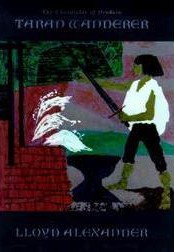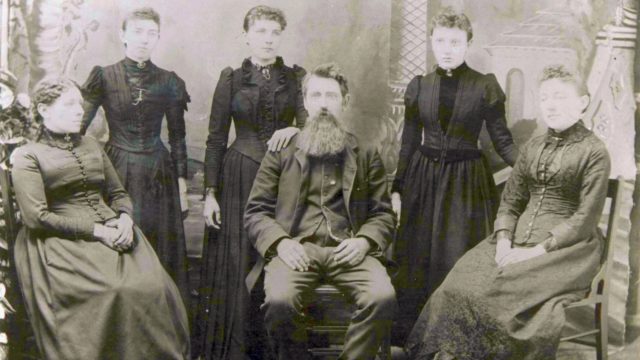Taran Wanderer
With Llonio, each day he visited the nets, the baskets, and the weir, sometimes returning empty-handed and sometimes laden with whatever strange assortment the wind or current brought. In the beginning he had seen no value in these odds and ends, but Llonio found a use for nearly all. A cartwheel was turned into a spinning wheel, parts of a horse bridle made belts for the children, a saddlebag became a pair of boots; and Taran realized there was little the family needed that did not, late or soon, appear from nowhere; and there was nothing — an egg, a mushroom, a handful of feathers delicate as ferns — that was not held to be a treasure. (Taran Wanderer, by Lloyd Alexander)
 Llonio is the most intriguing character of all to me in this fourth book of Lloyd Alexander’s Prydain Chronicles. I’ve been enjoying revisiting them as read-alouds with my children in recent weeks, and it’s with some trepidation that we turn now to the fifth and last book, The High King. I don’t want them to end!
Llonio is the most intriguing character of all to me in this fourth book of Lloyd Alexander’s Prydain Chronicles. I’ve been enjoying revisiting them as read-alouds with my children in recent weeks, and it’s with some trepidation that we turn now to the fifth and last book, The High King. I don’t want them to end!
In this novel Taran sets out in search of his personal history. He travels with some, but not all, of his familiar companions, and he meets some formidable enemies along the way. Among these the wizard Morda is the worst, and Taran’s encounter with him represents both a stunning victory and the narrowest of escapes. The outlaw Dorath, too, threatens Taran more than once, and at the end of the book he is still at large. (I suspect we’ll meet him again in the last book — though it’s been so long I can’t remember! I was in 7th grade or so when I read these the first time.)
But there are a number of marvelous characters as well: a smith, a weaver, a potter, a herdsman, a farmer. We get a glimpse of King Smoit, familiar from The Black Cauldron, in his own territory. Part of what makes this such an appealing story is that although Taran sees himself as a nameless wanderer in search of identity, and though he seeks and does not (to his satisfaction) find his calling in several trades that he tries out, we see that he is tremendously talented and capable in just about everything he tries. He is forever seeing himself as inadequate, and this is part of what makes him so likable. In this story he is more aware of his own feelings, particularly related to the Princess Eilonwy. Of course, we’ve known he was in love with her, but at last it’s evident that he knows it too (despite the fact that she does not make a single appearance in this book).
But this episode in which Taran stays a few days with Llonio and his family has intrigued me and been on my mind. Llonio and his family provide for their needs via whatever small gifts come their way. They’re a picture of contentment, partly because they gratefully and enthusiastically receive whatever comes, and partly because they have the skills and imagination to make the most of it. It’s been wonderful to think about in relation not just to faith, but to education, too. I’ve really loved reading this.



5 Comments
JW
Sounds a bit like the motto from the 30’s about use it up or make do.
And in regards to education: http://stephenrankin.com/party-culture-as-moral-community/ I know the title and the premise of his post is odd, but in the middle he has some great insights into moral education. Thought you might like to see.
Sherry
I remember Taran Wanderer was my favorite of the five book, but I don’t remember why.
Susan@ Reading World
Beautiful post. I loved these books so much when I was young, and loved them all over again when we read them aloud with my kids. That was a few years ago, and I might have to read them again just for myself.
Janet
I think I enjoyed them even more as an adult than I did as a child. This one was my favorite, too. I can relate to Taran as he searches for a place, and has to change his expectations…
SethH
Every time I read through the series, I don’t want it to end. And it always makes me remember my fifth-grade self. No wonder I like them so much.